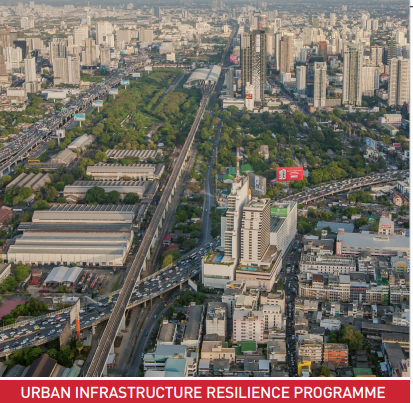- +91-11-4044-5999
- info@cdri.world
-
Copernicus Marg, New Delhi, INDIA
Urban Infrastructure Resilience Programme (UIRP)
The UIRP First Call for Proposals (CfP) aims to support cities in LMICs and SIDS in the application of data, tools, and knowledge leading to improved design, operation and maintenance of infrastructure, and to mobilize further customised technical assistance.
Call for Proposals English | French | Spanish
Factsheets English | French | Spanish
Resources CfP-Proposal Submission Template | CfP-Submission Guide | CfP-CV Template | CfP-Letter of Support Template | CfP-Work Plan Template | CfP-Budget Template
Cities play a pivotal role in global economy, contributing to more than 80% of the global Gross Domestic Product (GDP). Urban areas flourish economically due to the dense aggregation of individuals, infrastructure, enterprises, and resources within compact geographical zones. Infrastructure stands as the very backbone of city progress and economic development. Presently, more than half of the global population resides in urban areas, a number anticipated to rise to 70% by 2050 and an overwhelming 85% by 2100. As cities continue to burgeon and attract a significant portion of the global population, well-designed and efficient urban infrastructure becomes indispensable.
On a global scale, 70% of Average Annual Losses (AAL) are attributed to climatic hazards, marking a significant impact on urban areas. Among these hazards, rising temperature extremes, increased flooding, and water scarcity and security stand out as major climate change threats confronting cities. Climate variability has given rise to compounded hazards, combining warming and precipitation extremes in various parts of the globe. In 2023, temperatures surpassed the pre-industrial average for 1850-1900 by a significant 1.5°C. The repercussions of this human-induced climate variation are already evident worldwide, manifesting in extreme weather events and climate-related hazards.
Extreme climate hazards magnify disaster risk, asset loss, and service disruption, while existing infrastructure may lose its functionality. The damage or disruption of service of any infrastructure in city systems will also create compounding risks and cause widespread transboundary disruption in services.
As a global partnership, the Coalition of Disaster Resilient Infrastructure aims to ensure that the investments of its members and partners are aligned and well-coordinated in support of the shared ambition of disaster and climate resilience of new and existing infrastructure. CDRI's Urban Infrastructure Resilience Programme (UIRP) aims to enhance urban livability by promoting resilient infrastructure planning and implementing data-driven decision-making processes to manage urban shocks and stresses. UIRP initial work will focus on climate change-related hydro-meteorological challenges, such as extreme flooding, water scarcity, and heat, which are anticipated to significantly impact urban areas and populations. These challenges will disproportionately affect crucial services and urban development, especially vulnerable communities in Low- and Middle-Income countries (LMICs) and Small Island Developing States (SIDS).
To achieve the overarching goal of improved urban resilience in LMICs, CDRI has identified three objectives which form the building blocks of the urban strategy.
City infrastructure environment, services and systems are resilient against climate extremes through:
- Improved engagement with Member Countries and Partner Organizations
- Increased access to infrastructure finance through MDBs/investment banks/financing corporations
- Access to data, tools and knowledge by Urban Local Bodies (ULBs) leading to improved design, operation, and maintenance of infrastructure.
These objectives will be achieved through four intervention pillars which are mutually reinforcing. The four pillars are (i) Improved Awareness and Capacities (ii) Informed Infrastructure Planning (iii) Augmenting Financial Resources and (iv) Integrating Resilience into Infrastructure Operations and Maintenance.
The UIRP will be implemented through meticulously planned projects and interventions, targeting cities across varied geographic regions and exposed to diverse risks and natural hazards. In its initial phase, UIRP will concentrate on challenges related to extreme heat, urban flooding, and water scarcity in urban areas. These projects will have a cross-cutting nature, addressing multiple outcomes, and will be funded through the CDRI’s Multi-Partner Trust Fund, namely the Infrastructure Resilience Accelerator Fund (IRAF).
